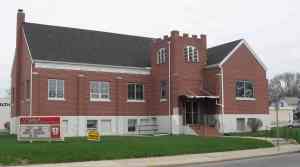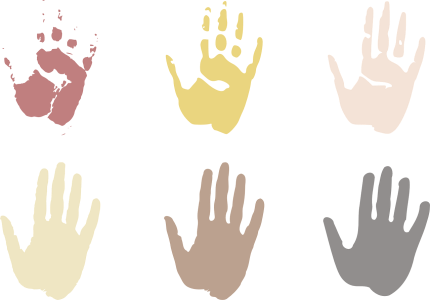by the Rev. Kyle Huckins, Ph.D, CSM Chairman
Anybody who’s driven around near downtown Marion, Indiana, has seen the stately brick building of Bethel African Methodist Episcopal Church on West 10th Street, but few know the fellowship can trace its history to close to the time of the Civil War and that it’s a namesake of the flagship of the first organized black denomination in the country.
April marks the 200th anniversary of the Rev. Richard Allen (after whom Marion’s Allen Temple is named) convening a meeting of five African-American Methodist congregations to band together into the AME Church. There had been independent black churches in the U.S. for nearly 50 years before that, but never had a group of them united in such a way.
“That allowed the church to be able to be effectively organized on a large basis” as “a place for witness, to deliver Christian services, and an opportunity to pool efforts at missions as well as education,” explained the Rev. David Daniels III, a church history professor at McCormick Theological Seminary in Chicago and an auxiliary bishop for education in the Church of God in Christ, another major African-American denomination.

The AME Church came out of racial conflict in St. George’s Methodist Episcopal Church in Philadelphia. Blacks had helped renovate and expand its facilities and went in for Sunday service a little late, deciding to sit where they had before their work on the structure rather than the new gallery for their race. During the opening prayer, a church official started trying to force the African-Americans to stand up and move to their restricted area. The small cadre of men said they would go after the petition, but the official would not hear of it.
The prayer was over by the time all rose, and they left both for that day and forever. “We all went out of the church in a body, and they were no more plagued by us,” Allen recounted.
The fledgling black Methodist movement had its first permanent home at Bethel AME Church, now known as “Mother Bethel” and also located, as St. George’s, in the rather ironically named “City of Brotherly Love.” The AME denomination in gaining independence had to endure several lawsuits from its former brethren in white Methodism, the actions filed despite the Bible’s admonition not to “go to law before the unrighteous” with fellow believers (1 Corinthians 6:1).
The AME Church rapidly expanded throughout the free North, and during and after the Civil War its ministers evangelized former slaves in the South and founded churches there. The first such congregation in the Marion area came from shortly before the wartime period, with Hill’s Chapel AME Church starting in 1849 in the onetime town of Weaver.

Marion’s Bethel AME Church began in 1873 and met in town at a number of buildings, including the county courthouse, before buying its current property on 10th Street. Today’s facility dates from the 1920s, with many changes and additions into the 1940s.
“We’ve always tried to meet people’s needs spiritually and physically,” said Amos Randle, a longtime steward (equivalent of deacon) at the local Bethel and a former Marion police chief.
African-Americans’ faith diversified as they emerged from slavery. During Reconstruction, the AME Zion Church was founded in New York City, followed shortly by the Colored (now “Christian”) Methodist Episcopal Church in Jackson, Tennessee.
The National Baptist Convention, USA, Inc., began in Atlanta in 1895, though several black Baptist congregations had more than 1,000 members by then. The Church of God in Christ, the first considerable African-American Pentecostal body, was started by Bishop C.H. Mason in Memphis in 1907 after his holiness emphasis caused concern among Baptists and charismatic theology distanced him from Wesleyans.
These groups and their local affiliates and independent black churches often spoke out on government policies and programs and aided efforts to elect African-American officials. The black church also had to unite to fight off movements without and within to repatriate its members in Liberia, Haiti and other foreign countries to settle what some whites termed “the race question.”
“In U.S. history, there have been very few groups willing to speak for the poor, the marginalized, and those who were exclud ed from arenas of power, particularly those of African descent,” Daniels said. “If the black church had not spoken up, it’s not clear who would have.”
ed from arenas of power, particularly those of African descent,” Daniels said. “If the black church had not spoken up, it’s not clear who would have.”
African-American churches were an important factor in the Great Migration, which had millions of blacks leave the segregated South for the healthier racial environments of the North and West in the early to middle 1900s. Groups of church members and sometimes entire congregations traveled together for safety, companionship and help getting started in their new homes.
The Civil Rights Movement of the second half of the 20th century saw black churches prominently involved, with Pastor Martin Luther King Jr. joined by many fellow Baptists and supported by COGIC, which furnished the site of his final speech, and the AME Church and other of the race’s denominations. Activists going on the Freedom Rides – convoys from the North to the South – often met in church buildings the night before anti-segregation demonstrations, listening to encouraging sermons, praying for one another and even petitioning for their opponents in order to obey Jesus’ mandate to “love your enemies (and) bless those who curse you” (Matthew 5:44).
The Rev. Freddie Banks, pastor of Marion’s Bethel AME Church, grew up toward the end of the Civil Rights Movement and saw how congregants in black churches depended on their spiritual home. For example, if they had need of legal advice, “people knew they could go to the church and someone in the church would have some sort of connection with the legal profession,” he said.
The local Bethel AME congregation has been losing members for several years, with perhaps 30 now in attendance on Sundays. The trend toward single-parent homes has hurt the church, Randle said. “When the devil saw he could break the family up, that tore up everything,” he observed.
Randle recalled from his childhood in the 1930s and ’40s that his parents would lead prayer at meals, teach Scripture to him and his siblings, and assign readings and chores. His father would come home from work and ask the kids, “Did you follow up and do what you were told to do?”
“And woe to you if you didn’t follow up,” Randle said.
Banks praised the remaining Bethel members, saying they’re “amazing” in their devotion, and that he’s trying a more “holistic” approach to ministry by bringing in health care workers to give checkups to members and putting to work his training as a licensed professional counselor as well as for his master’s degree in divinity.
The pastor is also active on Facebook and other social media, saying engaging the under-40 crowd will help the church “keep competitive” now that people no longer wall off their Sunday-morning schedules for worship.
“The black church has felt from its early years that compartmentalizing life into the spiritual, the political and the social realm is betraying the gospel of Jesus Christ,” said Daniels, adding the view is faith is “not to be quarantined in a segment called ‘spiritual.’”
That desire for religion to impact all areas of existence may just help the black church succeed in attracting millennials, as it claims for Christ new media platforms and music yielding younger members.

The recent increase in racism in the U.S. documented in polling by the Associated Press and other reputable sources is another challenge for the African-American church, which has been hit by outbreaks of arson and the murders of nine last year at Emanuel AME Church in Charleston, South Carolina. The latter came “because of a state legislator being pastor and that the congregation, being the historic black congregation in Charleston, represented a church that sought to speak out against racial injustice,” Daniels said.
Dylann Roof, the white, 21-year-old accused assailant, “wanted to attack the black church at the heart,” the professor concluded.
However, the African-American church seems unlikely to be stopped, having overcome slavery, war, segregation, lawsuits, lynchings and much more in its two centuries. The AME Church’s motto, “God Our Father, Christ Our Redeemer, the Holy Spirit Our Comforter, Humankind Our Family,” stresses the strength of black Christians is not in race but the Lord, and his power cannot be exhausted.
About the author: Kyle Huckins holds an earned doctorate in journalism and has completed significant graduate work in theology, teaching both at the college level. He has been a professional newsman since 1989. His new book of nationally award-winning columns, “Race, Faith and Politics Today,” is available at http://www.racefaithandpoliticstoday.com. He is also an ordained elder in the Church of God in Christ.
